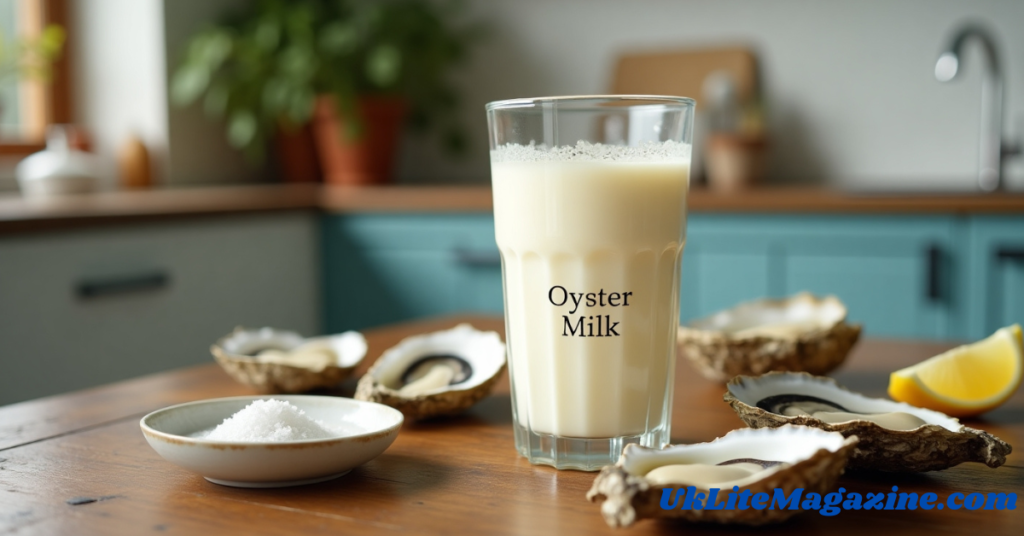Oyster milk is an emerging food product that has recently gained attention for its unique nutritional properties. While not widely known, it is becoming popular among health enthusiasts, seafood lovers, and those seeking alternative sources of essential nutrients. In this article, we will explore what oyster milk is, its benefits, uses, and nutrition facts.
What Is Oyster Milk?
Oyster milk is a liquid derived from oysters, either through blending, extraction, or specific processing methods that retain the valuable nutrients of oysters in liquid form. It is often used as a supplement, cooking ingredient, or even a dairy alternative in certain recipes.
Unlike traditional dairy or plant-based milk, oyster milk is rich in marine minerals, omega-3 fatty acids, and essential amino acids, making it a unique addition to the growing list of alternative milks.
Nutritional Value of Oyster Milk
Oyster milk is packed with essential nutrients that contribute to overall health. Below is a table highlighting its key nutritional components:
| Nutrient | Amount per 100ml | Health Benefits |
|---|---|---|
| Protein | 5-8g | Supports muscle growth and repair |
| Omega-3 Fatty Acids | 500-1000mg | Promotes heart and brain health |
| Zinc | 15-30mg | Boosts immunity and skin health |
| Vitamin B12 | 8-15mcg | Enhances energy and supports nerve function |
| Iron | 2-5mg | Prevents anemia and supports blood health |
| Calcium | 20-50mg | Strengthens bones and teeth |
| Magnesium | 10-30mg | Supports muscle and nerve function |
| Selenium | 20-50mcg | Acts as an antioxidant and supports immunity |
Health Benefits of Oyster Milk
Oyster milk is highly nutritious and offers several health benefits:
1. Rich Source of Protein
Oyster milk contains high-quality protein, making it beneficial for muscle repair, growth, and overall body function. This makes it an excellent option for athletes and fitness enthusiasts.
2. Boosts Immune System
Being rich in zinc, oyster milk helps strengthen the immune system, reducing the risk of infections and promoting faster wound healing.
3. Supports Brain and Heart Health
The omega-3 fatty acids found in oyster milk contribute to brain function, improving memory and reducing the risk of heart diseases by lowering inflammation and bad cholesterol levels.
4. Enhances Skin Health
The presence of zinc, selenium, and antioxidants helps improve skin health, reducing acne and promoting a healthy complexion.
5. Increases Energy Levels
Vitamin B12 in oyster milk plays a key role in energy production, helping to prevent fatigue and improve overall vitality.
6. Improves Bone Health
Calcium and magnesium present in oyster milk contribute to stronger bones and teeth, reducing the risk of osteoporosis.
Uses of Oyster Milk
Oyster milk can be used in various ways, depending on personal preference and dietary needs:
- As a Health Supplement: It can be consumed directly as a nutritious drink for a quick boost of essential nutrients.
- In Cooking: Oyster milk can be added to soups, sauces, and seafood-based dishes for enhanced flavor and nutrition.
- As a Dairy Alternative: Some people use it as a unique alternative to dairy milk in smoothies and recipes.
- For Skin and Hair Care: Due to its high mineral content, some beauty products incorporate oyster extracts for skin nourishment.
How to Make Oyster Milk at Home
If you want to try making oyster milk at home, follow this simple process:
Ingredients:
- 5-6 fresh oysters (shucked)
- 1 cup of water
- A pinch of sea salt (optional)
- Lemon juice (optional for flavor)
Instructions:
- Blend the oysters with water until you achieve a smooth consistency.
- Strain the mixture through a fine mesh to remove any solid particles.
- Add a pinch of sea salt or lemon juice for taste.
- Store in an airtight container and refrigerate for up to 2 days.
- Shake well before using.
Conclusion
Oyster milk is a nutrient-dense liquid that offers a variety of health benefits, including boosting immunity, improving skin health, and supporting heart and brain function. While it may not yet be widely available, those interested in marine-based nutrition can explore its uses and even prepare it at home. Whether you try it as a supplement or as a cooking ingredient, oyster milk is a fascinating addition to the world of alternative nutrition.
Frequently Asked Questions (FAQs)
1. Is oyster milk safe for everyone?
Oyster milk is generally safe for those who are not allergic to shellfish. However, individuals with seafood allergies should avoid it.
2. Where can I buy oyster milk?
Oyster milk is not yet widely available in stores, but some specialty seafood markets and online retailers may offer it.
3. Can I use oyster milk in coffee or tea?
It is not commonly used in hot beverages, as its taste is quite different from traditional dairy milk. However, it can be experimented with in seafood-based broths and soups.
4. How does oyster milk taste?
Oyster milk has a mild, briny flavor with a hint of seafood essence. It pairs well with savory dishes but may not be suitable for sweet recipes.
5. How long does oyster milk last?
Fresh homemade oyster milk should be consumed within 1-2 days if stored in the refrigerator.

